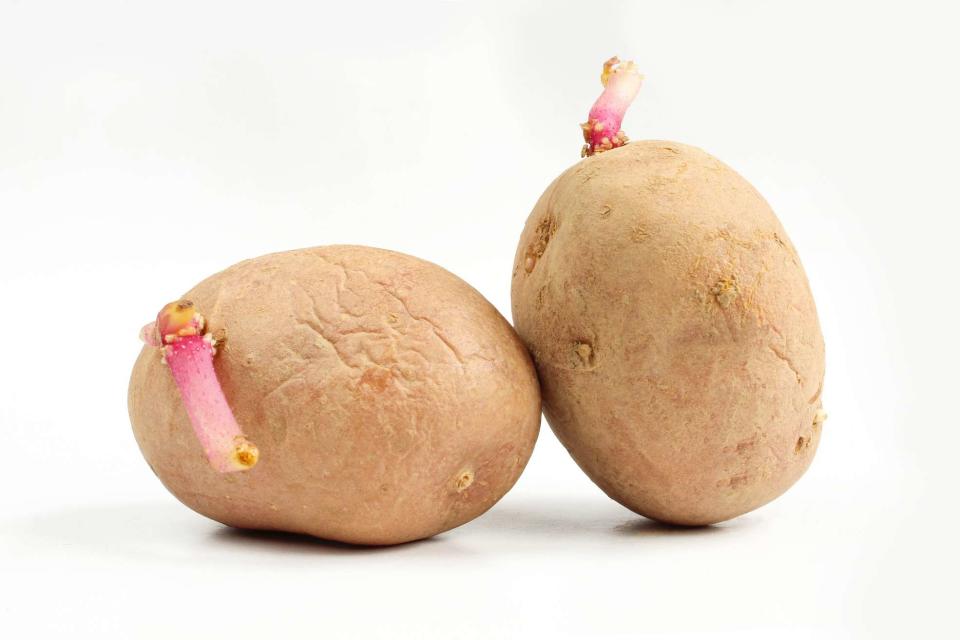Can You Eat Wrinkled Potatoes?
If your spuds are shriveled, here's what you can do with them.

Getty Images
Baked potatoes, mashed potatoes, potato leek soup, potato salad—as a side dish or a comforting main, potatoes fit neatly into nearly every meal of the day. But what happens if you go to the pantry, grab several potatoes, and notice they're shriveled? Can you eat these wrinkled potatoes?
The answer isn’t positive. You’re going to want to scratch all your potato meal ideas or only use the ones that aren’t wrinkled because potatoes that are shriveled aren't okay to eat.
Keep reading to find out why shriveled potatoes aren’t safe to eat and the best way to store them so potatoes don’t wrinkle as quickly.
Are Shriveled Potatoes Safe To Eat?
No, shriveled or wrinkled potatoes should not be eaten.
"Potatoes that have started to shrivel, wrinkle or soften and develop long sprouts are not safe to eat," says Michael Handel, chef-instructor of Culinary Arts at the Institute of Culinary Education (ICE). When potatoes begin to wrinkle, it’s a sign that they are breaking down.
"The shriveled or wrinkled appearance of a potato is a sign of decay," explains Brian Bistrong, Culinary Director at The Park. "This causes the potato to feel mushy, lose its flavor. and even taste sour.”
Not only will the potato not taste very good, you could risk getting sick. Bistrong explains, "As with any vegetable or ingredient, consuming it rotten could make you sick or unwell."
As potatoes begin to break down, a compound called solanine increases. "While potatoes, as a member of the nightshade family, normally contain some amount of solanine, the toxin increases when potatoes are exposed to light," explains Handel. The skin of the potato may begin to turn green, which is chlorophyll, and this signifies there is increased solanine.
If you’re wondering what can happen if you consume too much solanine, Handel explains, "Solanine has a bitter taste, and when consumed in sufficient quantities, may cause nausea, vomiting, diarrhea, headaches, and possible paralysis."
So if you find shriveled potatoes in the pantry, chuck them directly into the compost or toss them in the trash.
What's the Best Way To Store Potatoes?
Properly storing potatoes will help minimize shriveling and keep them from going bad quickly. There are several things to consider when it comes to storing potatoes.
"Potatoes should be stored in a cool, dark place, with a temperature around 50°F, with good air circulation,” explains Handel. "This will help to keep the potatoes firm and help prevent the formation of sprouts."
You’ll also want to avoid placing onions near potatoes. “Potatoes should not be stored together with onions, as the gasses from the onions may speed-up potato-sprouting," Handel adds.
Can you store potatoes in the fridge?
The temperature of a refrigerators is too cold and changes the chemistry of the potato. “Refrigerating raw potatoes is not recommended, as the natural sugar in the potatoes increases and gives the potatoes a sweet flavor when cooked,” says Handel.
How Long Do Potatoes Typically Last?
These root vegetables don’t have an extended shelf life and shouldn’t be left in the pantry for months. "Not only do vegetables go bad the longer they’re stored, but they also lose nutritional content and flavor," explains Bistrong. "I use my vegetables within days of purchasing, even if this means going to the market a couple of times a week.” S
hopping every few days for produce may not be convenient or even possible. “I understand not everyone is willing to do this, so it's safe to say that a five-pound bag of potatoes can last two to three weeks, if stored properly," he says.
For more Southern Living news, make sure to sign up for our newsletter!
Read the original article on Southern Living.

